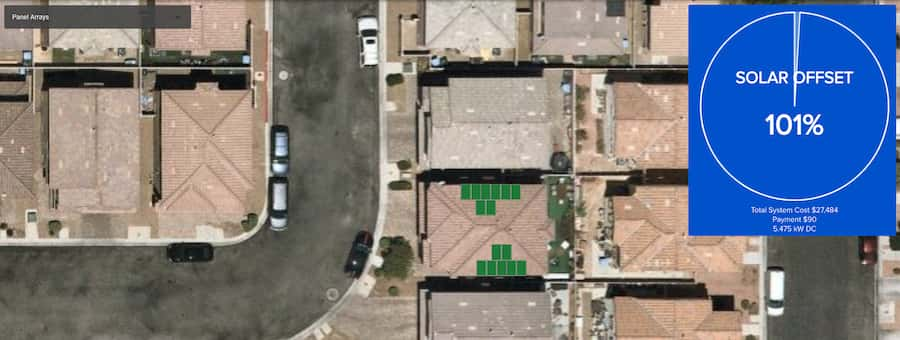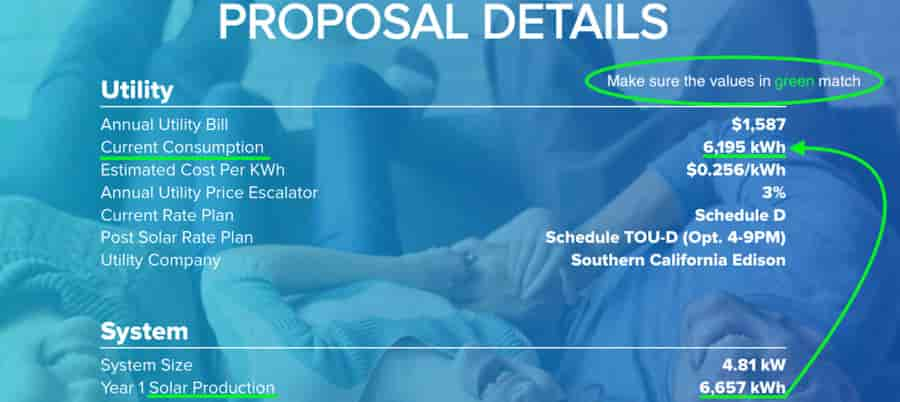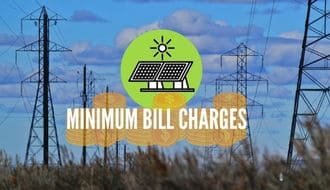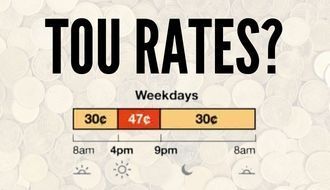What Is "Offset" & The Importance of It When Sizing a Solar System
What is Solar Offset?
Believe it or not, this one thing called
offset has contributed to
polarizing the opinions about solar like nothing else. And with all reason, since many solar companies use it to their advantage to sell
undersized systems. You'll see why.
After getting net metering out of the way, it's time to talk about that. It's fairly straightforward:
- A house with an offset of 100%, means that it gets 100% of the electricity it calls for, from its solar.
- A house with an offset of 90%, will only get 90% of the energy from solar and the other 10% will come from the power company. In other words, that 10% will have to be paid to them, at the rate they impose.
Why does it matter?
Well, it allows you to know if the company gave you what you needed or they promised you the moon but delivered a miniature of it instead.
I've seen some solar companies do one of these 2 things. In the worst cases, even both.
#1 They hide this concept from their customers
They make it look like it were a hard-to-understand solar industry jargon when in reality it's as easy as it gets. All to avoid talking about it.
I've seen project spec sheets with that big bold number at less than 100. But they still promise their customers they'll get 100% of the energy they need from their solar.
How is that even possible if the offset is not at 100%? You see what I'm saying?
That's where the importance of informing yourself comes into play. Props to you because that's exactly what you're doing right now. Had the poor unsuspecting ones known this before, they would've not put themselves into that situation.
Preventing this is easy.
Just make sure that your project
clearly states the offset at 100% and you'll be good. As easy as that, but in hopes of making it even clearer, here's an image of how it should look like:
#2 Altering the numbers
There is a reason why people who design the systems are the ones in charge of that and that only. But like with everything, funky people will always try to find their way around things. And offset was not the exception.
Why do they do this? To either increase the commission they get from the install or because there's a shortage of equipment and they just can't let that extra sale slide by them.
Sadly, after projects are designed, I've seen sales reps get comfortable with design tools, enough to be able to alter the design themselves to where they make the numbers work.
They think they're so smart and that they fully understand this, but in reality, the performance of the system is being damaged and it's going to cost the homeowner a couple thousand bucks.
Are these acts of bad faith or are they not even aware they're wounding their clients?
Even the big names are guilty of this! The good thing is there are already class-action lawsuits in the works for them. At the end of the day, one gets what one deserves.
I know, I know. You're probably saying "who are them?", "tell me their names". I swear I'd love to, but if I did, we'd be the ones getting sued and not them haha.
Instead of that, why don't we talk about how you can avoid these hardships.
How Can I Protect Myself From That?
With the offset tip I just gave you in the image above, you're already more protected than many naive homeowners.
But with these 2 tips that I'm about to give you, you'll be 100% protected. Just like your offset! Caught the joke there?
Tip #1
Reps can tinker with designs as much as they want. What they don't know is that there's still something at sight for all of us that gives it away. When projects are altered, the offset might still show 100%, but these 2 numbers will never correlate...
Even if the offset is at 100%, watch for these two. The 1st one, from top to bottom, is how much energy your house uses per year. The 2nd one is how much of that your solar will produce.
It's as easy as making sure there's not a huge gap between them. Meaning that your solar production (2nd number) shouldn't be way below your yearly consumption (1st number).
This is the only way you can ensure that your system is going to be offsetting 100% of the energy your house needs because it was properly sized. (Yes, this is where the word comes from).
It's like being able to see into the future and knowing it'll work.
Tip #2
Interactive project sheets. Yup, that's it!
They're such beautiful things because they help bring transparency to life when it comes to your project. See for yourself:
They let you click around and plug in your own numbers to see what would happen if you modify something. They're directly linked to the original design so that NO funky business can take place.
If somebody changes something, all of the math will be recalculated and all of the numbers in the project sheet will be updated. Including offset, production, performance, etc. Now that's some transparency!
In hopes of taking that to next level, we offed our sales reps and switched them to specialists. Now the person that designs your project, and that knows the ins and outs of it, is the same you'll be talking to.
"They might not be the most brilliant in persuasion techniques, but they sure as hell are the most proficient and capable ones when it comes to designing a foolproof system and helping you understand why it would work." (De La Cruz, SOLARI® C.E.O., 2021)
Share with those who you care about.
Let us know what you think...








